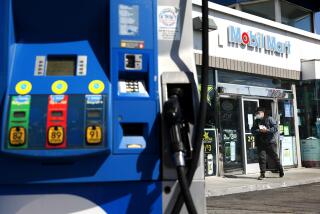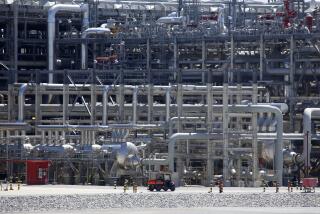PERSPECTIVE ON ENERGY : We Must Pay Full Price for Energy : For awhile we got government out of the energy business. Now, in the Gulf, it’s back into energy in a big way.
- Share via
When the rhetoric is stripped away, the uncomfortable truth is that the United States has sent troops to the Persian Gulf to protect low oil prices.
This policy should come as no surprise. The United States remains a gas guzzler of a nation. We are far and away the biggest oil user, accounting for 25% of world consumption.
The share of oil imported by the United States grew from 32% in 1985 to 46% in 1989. This year, imports are projected (or at least were projected) to reach 50% of the total, exceeding the previous high of 48% set in 1977.
Rising oil imports and the continued high-energy intensity of the U.S. economy are the inevitable result of 10 years of mismanagement by the White House and Congress. For a decade, American political leaders have abandoned any pretense of forging a national energy policy worthy of the name. The watchword has been, “Get government out of the energy business.” Ironically, government is now back in the energy business with a vengeance in the Persian Gulf: 197,000 U.S. military men and women are in the region or en route.
The studied inaction of our government has made our economy vulnerable to oil-price shocks and supply disruptions. Between 1973 and 1989, the amount of oil the United States imported from the Persian Gulf doubled to more than 2 million barrels per day. We placed ourselves in jeopardy by ignoring the warning signs that dependence on OPEC would grow if we failed to curb oil use.
Now that Iraq’s Saddam Hussein has forced us to see the consequences of inaction, we should be ready to deploy a comprehensive energy policy, which could be as useful a weapon as aircraft carrier-based F-18s in the current crisis and far more useful in the long run.
A forward-looking energy strategy must guarantee an affordable supply of energy, while enhancing international security and environmental protection.
The keystone of U.S. energy strategy must be sharp increases in efficiency. We need national policies that push energy efficiency upward even faster than the 1974-1986 period, a time of impressive gains--such as doubling average new-car mileage from 14 to 28 miles per gallon.
We should avoid repeating the mistakes of the 1970s by rejecting price controls. Higher energy prices and specific policies should encourage car-pooling and the use of public transportation. We should also reinstate the 55 m.p.h. speed limit nationwide, since driving 10 m.p.h. faster than that can cut auto-fuel efficiency by up to 30%.
At the same time, we must work to improve the efficiency of our transportation system, which accounts for two-thirds of U.S. oil consumption. We should increase new-car fuel efficiency by about 50% over the next decade and create incentives for the early retirement of older vehicles. The emphasis of transportation planning--and especially of federal financial support--must shift from highway construction to a more balanced mix of buses, light rail, heavy rail and other forms of public transport.
For the longer term, we should begin in earnest the process of weaning our transportation fleet from oil. So-called alternative fuels--including reformulated gasoline, methanol and compressed natural gas--aren’t the long-term answer. Reformulated gasoline and methanol would still be imported, and domestic natural gas resources are inadequate to support a major increase in demand for motor-vehicle use. Moreover, all are fossil fuels, so all contribute to the buildup of carbon dioxide in the atmosphere. The next century will require cars that run on electricity or hydrogen made from renewable sources of energy.
At the root of our problem is America’s addiction to cheap energy. Nothing has done more to slow the momentum of efficiency gains and jeopardize U.S. energy security. Until the Iraqi invasion of Kuwait, gasoline prices were lower in real terms than at any time since World War II. European motorists pay three to four times as much for gasoline as Americans, a price difference caused mostly by European energy taxes. Partly as a result, they use less than half as much gasoline per capita.
Unless our leaders can muster the political courage to ensure that prices truly reflect all of energy’s long-term costs--economic, environmental and defense-related--we’ll never get our house in order. It would be a sad commentary if our leaders found it easier to send Americans to fight in the desert than to impose gasoline and other energy taxes.
More to Read
Sign up for Essential California
The most important California stories and recommendations in your inbox every morning.
You may occasionally receive promotional content from the Los Angeles Times.








